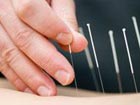| Videos | • Latest |
|
• Feature | • Sports | • Your Videos |
China's acupuncture carried out in Europe

The acupuncture and moxibustion of traditional Chinese medicine were inscribed by UNESCO on the Representative List of the Intangible Cultural Heritage of Humanity last year. Acupuncture, a priceless cultural legacy of all human beings, is practiced not only in China but also around the world. Let's visit Europe to find out how acupuncture is carried out there.

The practice of acupuncture is highly integrated into the medical systems of European countries like Italy and the Netherlands. Patients in the Netherlands are offered options to receive acupuncture treatment in a number of certain hospitals. And most of the cost is covered by local organizations and units.
Lin Bin, Chinese Medicine Specialist, said, "There're about 145-thousand people who practice Chinese medicine in Europe, among whom 30 percent are professionals. And 40 percent of the professionals prescribe herbal medicines quite often. This is a good direction."
A patient in Utrecht, the Netherlands, says he came to acupuncture therapy to try his luck. And the result is far beyond his expectations.
So he then recommended his wife, who suffered from devastating headaches, to give it a try too.
Traditional Chinese Medicine was introduced to the European continent hundreds of years ago. So far the Netherlands has become the distribution center of Chinese medicine products in Europe.
However, the practice of traditional Chinese medicine is also challenged by an EU Directive on traditional herbal medicines, which was issued in March 2004. The regulation requires that after a seven-year transition all herbal medicines circulating on the market must apply for a license before they can be sold. But so far not a single herbal medicine has been approved to be legally registered.
Experts point out that industry practitioners are in urgent need of smoother collaboration with relevant EU organizations. And the successful inscription of Traditional Chinese Medicine onto the UNESCO list is a good opportunity for practitioners to find a way to move forward together with their European peers.
 0
0 







Go to Forum >>0 Comments